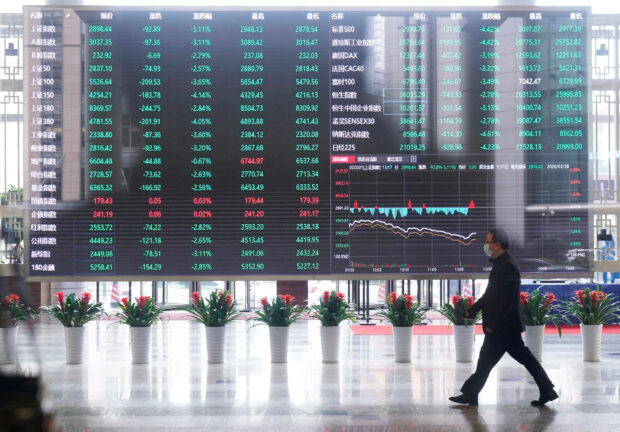Asian stocks draw massive foreign funds on China’s reforms, AI surge

A man wearing a face mask is seen inside the Shanghai Stock Exchange building at the Pudong financial district in Shanghai, China Feb 28, 2020. REUTERS/Aly Song/File Photo
Foreign investors poured substantial money into Asian equities in February amid a rebound in Chinese stocks following Beijing’s rollout of reform measures and a surge in technology shares, driven by the artificial intelligence (AI) boom.
Data from stock exchanges in South Korea, Taiwan, Indonesia, India, the Philippines, Thailand and Vietnam showed foreigners purchased a net $10.82 billion worth of regional equities last month, after selling shares worth nearly $779 million in January.
The MSCI Asia-Pacific index rebounded last month with a 4-percent increase, offsetting January’s decline, as traders shifted focus to upbeat Asian corporate earnings from concerns over delayed rate cuts by the U.S. Federal Reserve.
READ: Asian equities attract largest inflows in seven years
The bulk of the inflows was directed towards South Korea and Taiwan, recognized as the region’s tech hubs, which received $6.1 billion and $3.7 billion, respectively.
South Korea, Taiwan equities
“The artificial Intelligence (AI) hype saw little signs of abating in the month of February, with investors still preferring to lean into semiconductor stocks and being the region’s semiconductor hub, that may account for the strong inflows into South Korea and Taiwan equities,” said Yeap Jun Rong, market strategist at IG.
READ: South Korea vows support for its chip sector amid China-US tension
Indonesian, Indian, the Philippine, and Thai equities attracted inflows of $647 million, $186 million, $129 million, and $93 million, respectively.
Vietnam’s equities, however, experienced a marginal $59 million outflow, contrasting with the $48 million of net purchases in the previous month.
Jason Lui, head of equity and derivative strategy for Asia Pacific at BNP Paribas, highlighted the potential impact of major elections in the region and the U.S. on investment decisions.
“The combination of rising trade tensions (Donald Trump is considering new rounds of tariff) and the FED potentially staying on hold for longer may result in more conservative allocation into the EM Asia equities,” he said.
“In the case of India, foreign investors will be focusing on the election results as Indian voters are expected to vote between April and May.”